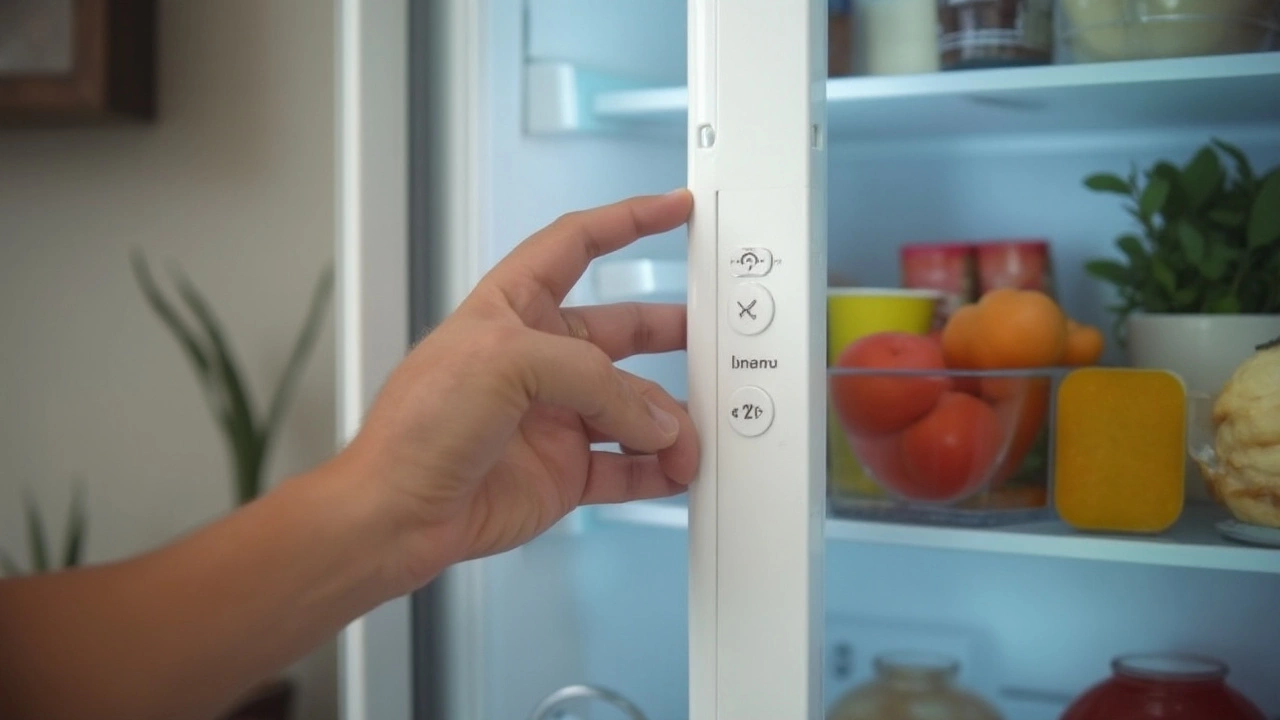If you've ever wondered how long your trusty refrigerator will last, you're not alone. Many of us rely on these kitchen workhorses every day, so understanding their longevity can help us plan better. The typical lifespan of a refrigerator will give you a good starting point.
Several factors come into play when determining how long a fridge will serve you efficiently. From the brand and model to maintenance habits and usage frequency, each aspect contributes to your appliance's lasting power.
Recognizing when a refrigerator is nearing the end of its life is crucial to avoiding sudden inconveniences. This article covers everything you need to know about prolonging the life of your fridge and knowing when it's time to seek repairs or buy a new one.
- Typical Lifespan of Modern Refrigerators
- Factors Affecting Fridge Longevity
- Signs Your Refrigerator Might Be Dying
- Maintenance Tips for Extending Fridge Life
- The Role of Technology in Refrigerator Durability
Typical Lifespan of Modern Refrigerators
When you purchase a new refrigerator, you're not just buying an appliance; you're investing in a long-term companion that will help store your food safely for years to come. But just how long can you expect your refrigerator to last? Generally speaking, modern refrigerators tend to have a lifespan ranging from 10 to 20 years. While this is a broad range, several factors contribute to where your fridge might fall within these boundaries. It's worth noting that many of the older generation models have been known to outlast their modern counterparts, thanks to simpler mechanisms and fewer electronic components. However, today’s models often come packed with features aimed at conserving energy and enhancing convenience.
The type of appliance can significantly affect longevity. For instance, side-by-side models are typically expected to last up to 20 years under optimal conditions, if given proper maintenance and care. On the other hand, top-freezer and bottom-freezer models generally come with a lifespan expectation in the shorter range of the spectrum, approximately 12 to 15 years. It’s not uncommon for certain high-end brands with robust designs and advanced technologies to stretch beyond these figures, though this frequently depends on usage patterns and maintenance frequency.
Another intriguing factor affecting your fridge’s lifespan is its usage environment. A refrigerator in a commercial setting, serving a bustling kitchen, is likely to experience more wear and tear compared to a unit happily chilling refreshments in a family’s home. A well-maintained refrigerator that isn't constantly overstuffed and that functions in a well-ventilated area can significantly extend its expected working life. For example, a common recommendation is to have at least an inch of space on each side of the refrigerator to allow for airflow which is crucial for maintaining optimal operation.
According to a survey reported by the U.S. Department of Energy, refrigerators over 15 years old consume about 33% more energy than newer Energy Star-certified models. This data nudges homeowners to consider not only the initial cost and lifespan but also the appliance's long-term impacts on utility bills. More efficient models provide savings that can balance the scales on maintenance and occasional repairs, underlining the importance of making informed decisions when purchasing a new unit.
"Consumer behavior plays a pivotal role in an appliance's lifespan. Regular and thoughtful maintenance, such as ensuring door seals are tight and that coils are clean and unobstructed, can extend a refrigerator's life by several years," notes appliance expert, Jennifer Harris.In essence, while the typical lifespan of a modern refrigerator is surrounded by variables, understanding these nuances allows you to manage expectations and strategize appropriately. It encourages households not only to anticipate potential replacements but also to be more conscientious caregivers of their fridge to maximize its durability. By combining newer technology with diligent upkeep, realizing the upper limits of a refrigerator's lifespan becomes a more achievable target.
Factors Affecting Fridge Longevity
Have you ever wondered why some refrigerators last longer than others? It's not just the manufacturer that plays a role, but several factors intertwine to determine the lifespan of these essential appliances. One significant factor is the frequency of use. A refrigerator that’s constantly opened and closed multiple times a day, like those in a family setting, can experience more wear and tear compared to one used sparingly. The constant cycle of compressing warm air means the compressor works harder, potentially shortening the appliance's life.
Another crucial aspect influencing a fridge's longevity is maintenance. Regular cleaning of the coils and ensuring the door seals are intact can significantly extend the life of your fridge. Dusty or blocked coils mean the cooling system has to exert more energy to maintain the desired temperature, which in the long run, can affect the appliance adversely. An annual inspection, inevitably, is a small effort for a significant return. Imagine having a refrigerator last a decade or more, simply because it was well cared for!
Location plays a deceptive yet vital role too. Fridges placed in garages or other non-insulated spaces often suffer more due to extreme temperature fluctuations. The harder the fridge has to work to maintain its internal temperature in such conditions, the quicker it may burn out. Similarly, a refrigerator kept in an environment where the temperature is excessively high tends to have a shorter operating life.
Another influencing factor is the initial quality and brand reputation of the appliance. Often, a well-established and trusted brand invests more in the durability of their products. The materials and technology they use tend to resist wear more effectively. This doesn't mean the most expensive fridge is always the best, but rather, investing in a trusted brand might offer more peace of mind over time. Consideration should be given to warranty as well; a manufacturer willing to back their product with a longer warranty period generally indicates a level of trust in their product's longevity.
Finally, advancements in technology can also impact how long a refrigerator lasts. Modern fridges with smart technology can offer features like adaptive defrost which can extend the life of the unit. Innovations that help in reducing the energy strain can contribute to better longevity. As noted by a prominent appliance expert,
"Adopting energy-efficient technologies not only saves you on bills but often reflects an extended appliance life."It's an evolving dance of engineering genius that continues to offer longer-lasting and more efficient solutions for everyday living.

Signs Your Refrigerator Might Be Dying
Your refrigerator is an essential part of your home, quietly keeping your food fresh and your drinks cold. But like any machine, it has a finite lifespan, and there may come a time when it starts to lose its edge. Recognizing the signs of a dying refrigerator is crucial so you can address small issues before they escalate into major headaches. One of the first indicators might be unusual noises. While all refrigerators make some humming or buzzing, persistent strange sounds such as clanking or grinding might hint at internal mechanical problems.
Temperature inconsistencies could also be a major red flag. If you notice that some areas of your fridge are too warm while others freeze items unintentionally, it might mean that your refrigerator's thermostat is failing. This inconsistency not only compromises the quality of your food but also increases energy consumption. You might also observe condensation on the inside or outside of the fridge. This could be an early indication that the seals around your refrigerator doors are no longer airtight, allowing warm air to seep in.
Another sign to watch for is spoilage that seems to occur more quickly than usual. If your food is spoiling well before its expiration date, it might suggest that your fridge is not maintaining the correct temperature. An overworked motor that continuously cycles on and off is not only a potential noise nuisance but a sign that the refrigerator is striving to maintain a cool environment. Frequent motor activity can lead to skyrocketing energy bills as the appliance struggles to operate efficiently.
In some cases, you might see an uptick in your utility bills without other tangible changes in your home. This could be a subtle sign that your refrigerator is losing its efficiency. If you're unsure, an unusually high power bill might prompt a closer inspection of your fridge. Keeping an eye on visible structural damage, such as rust or cracks, is also important. Over time, wear and tear or leaks might lead to rust forming on the exterior or interior of your fridge, hinting at larger issues at play.
Sometimes, these concerns can be confirmed by appliance experts who see these problems daily. "When customers come to me with issues like this, it's often time to consider either extensive repairs or even replacement," says Jarvis O'Neill, a trusted appliance repair specialist.
“Early intervention can save folks a lot of stress and money down the road.”In essence, being proactive and responding to these signs can substantially delay the need for an urgent upgrade, allowing you to navigate your appliance’s twilight years with a planned approach. The key takeaway here is vigilance: regular maintenance checks can forestall sudden failures and extend the life of your trusty fridge.
Maintenance Tips for Extending Fridge Life
Taking care of your refrigerator is one of the best ways to ensure it continues to serve you well for years. This process begins with a few straightforward maintenance habits that can make a world of difference. First and foremost, make sure to regularly clean the coils, which are usually located at the back or beneath your fridge. These coils are responsible for heat dissipation. When they're covered in dust and grime, the appliance works harder to keep everything cool, significantly reducing its lifespan. It's a tedious task that many overlook, but a mere vacuum or gentle brush can go a long way.
Keeping the door seals in check is equally critical. These rubber gaskets prevent cold air from escaping and warm air from sneaking in. To test their effectiveness, try the dollar bill method: close the door on a bill, and if you can easily pull it out, it’s time to replace them. This simple check can save a lot on energy bills and enhance your fridge's efficiency. Let's not forget about temperature settings, often set on extremes without much thought. Maintaining an optimal temperature of 37°F to 40°F ensures your food stays fresh without putting undue strain on the appliance. A thermometer can be a small investment with big rewards, helping keep your fridge in its ideal operating range.
Organization might not be an obvious maintenance step, but it's essential. A packed refrigerator doesn’t allow for proper airflow, something crucial for maintaining a consistent temperature. Be mindful of space and try not to block vents with containers. Creating a guide for weekly sorting through expired foods and reorganizing shelves can alert you to issues like gaps where cold air tends to escape. Also, this regular inspection helps address potential spills early, preventing sticky substances from becoming breeding grounds for bacteria.
Sometimes, prevention means listening to your fridge. If you notice unusual noises, it may indicate mechanical issues that need addressing. An experienced technician can determine whether it’s a small fix or a sign pointing to deeper issues, thus saving unnecessary repair costs down the line.
Engaging with expert advice, like those found in appliance care articles by organizations such as Consumer Reports, can offer invaluable insights into extending your refrigerator’s life. Their comprehensive guides emphasize how minimal maintenance can save significant headaches later.
Once in a blue moon, defrosting might still be necessary even for modern fridges that promise frost-free technology. Ice buildup in freezers can mask serious issues with the defrost system, so don’t neglect this action should you notice excessive layers of frost. Finally, embrace the idea of routine professional check-ups. While we might think of our refrigerator as a simple plug-and-play device, its inner workings are quite complex and will benefit from being looked at by a knowledgeable eye once a year. Such proactive care often translates to even greater appliance longevity.

The Role of Technology in Refrigerator Durability
In the age of rapid technological advancement, the world has seen remarkable improvements across all household appliances, and refrigerators are no exception. The integration of innovative technology has reshaped how we perceive refrigerators, particularly when it comes to their longevity. It’s no longer just about keeping food cold; modern fridges are designed to interact with your home's other smart devices, maintaining efficiency while still enhancing performance. High-tech features such as adaptive defrost, multi-airflow cooling systems, and smart temperature management not only improve cooling efficiency but also play a significant role in extending the fridge lifespan.
The latest fridges come equipped with energy-efficient compressors that not only ensure the refrigerator runs quietly but also that it consumes less electricity. This has positive ramifications for durability, as reduced energy loads contribute to lesser wear and tear. Furthermore, the implementation of IoT (Internet of Things) in fridges allows them to self-diagnose potential issues, alerting owners to necessary maintenance before problems escalate. These improvements are particularly crucial, given that a stitch in time saves nine, preventing extensive damage that could reduce a refrigerator's lifespan.
The conservation of perishables in modern refrigerators is less about simple mechanics and more about intelligent design. Companies have recognized the significance of humidity-controlled crisper drawers and convertible zones that adapt the interior climate based on what you’re storing. These advancements not only aid in preserving food better but also in reducing the strain on the appliance, adding years to its life. As per a study published in "Home Appliance Magazine", smart refrigerators are predicted to last around 15% longer than their older counterparts, provided they are subjected to regular maintenance.
Some industry insiders argue that technology's double-edged sword is evident in the increase in appliance complexity, which can sometimes hinder DIY repairs. As technology advances, so too does the necessity to understand it. This has subsequently led to a rise in professional fridge repair services, as owners often find themselves out of depth with repairs. Yet, this professional care helps in ensuring that the appliance is getting expert attention when needed, thus safeguarding its longevity in the long run.
On the environmental front, technological advancements are intentionally veering towards making household appliances more eco-friendly. With the global emphasis on sustainability, refrigerators now use refrigerants that are less harmful to the ozone layer and keep energy consumption minimal. This thoughtful intersection of environmental consciousness and engineering innovation is crucial because it contributes to the longevity of the appliance by ensuring it operates efficiently across various households with diverse energy capacities.
In conclusion, while technology complicates the machinery within refrigerators, it ultimately serves as an ally in prolonging their lifespan. The blend of efficiency, sustainability, interconnectivity, and maintenance diagnostics only fortifies the refrigerator maintenance routine, promoting appliance longevity. As these technological strides continue to unfold, they herald a promising future where our fridges last longer and perform better, joining the list of smart appliances that make everyday life simpler and more efficient.


